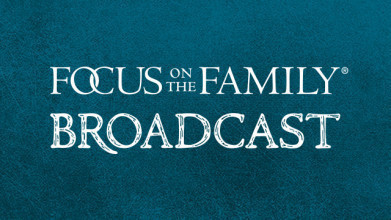Preview:
Dr. Juli Slattery: Part of the art of being a wife with your particular husband is what does it look like to have those two things in balance so that my husband knows I’m on his team, that I believe in him, but I’m also not afraid to step up and offer needed counsel, insight and accountability?
End of Preview
John Fuller: That’s Dr. Juli Slattery describing a woman’s unique role in marriage. And today she’ll empower wives and describe how you can use your strength to build a more fulfilling marriage. This is Focus on the Family with your host Focus president and author Jim Daly, and I’m John Fuller.
Jim Daly: John, I think just about every couple enters marriage with wonderful expectations. It’s gonna be bliss, this is awesome. We’re always gonna be infatuated with each other (laughs). But it’s normal not to feel warm and close to your spouse 24/7. At some point that infatuation wears off. When you start to notice perhaps the flaws in the other person (laughs) and uh, you’re going, “Okay.” Maybe even saying to yourself, “Did I marry the wrong person?” If you’ve felt this kind of disillusionment with your marriage, uh, today is going to be for you. And next time too, we have a wonderful guest who knows Focus well. She used to work here at Focus and be a co-host of the program.
John: Mm-hmm.
Jim: And she will offer that encouragement for those, uh, marriages that are facing that disappointment and disillusionment.
John: Yeah. And we’re speaking, uh, to women primarily, but men, I’m gonna encourage you to listen in because there are some really great takeaways here, uh, for you to have conversation about with your wife. Uh, Dr. Juli Slattery is a clinical psychologist, is uh, president and co-founder of Authentic Intimacy, which is a ministry, uh, devoted to teaching God’s design for sexuality. And she also hosts a podcast called Java with Juli. I think you started that back here in the Springs, is long time ago, Juli.
Dr. Slattery: Yeah.
John: Uh, she’s written an updated version of her book which has helped countless marriages, it’s called Finding the Hero in Your Husband, Revisited: Embracing Your Power in Marriage. Contact us to get a copy of that book for yourself or someone, uh, in your sphere of influence. Our number is 800, the letter A, and the word FAMILY, or stop by focusonthefamily.com/broadcast.
Jim: Juli, welcome back to Focus. It’s so good to see you.
Dr. Slattery: So good to see you guys, always good to be here.
Jim: It’s um, you’re doing great. Uh, you are tackling an area of the proverbial garden that a lot of people don’t want to go to, and that’s how to strengthen marriages, help marriages develop better emotional and physical intimacy in marriages. Uh, what drove you to that part of the garden? (Laughs).
Dr. Slattery: Well, I know it’s cliche to say, but it really was God. Uh, it was really something that he put on my heart, and I just saw so much brokenness that I felt like we didn’t quite know how to handle in the church, um, particularly around sexuality. So, um, yeah. Yeah, so-
Jim: Yeah, it’s good. When you look at the original book, Finding the Hero in Your Husband, which was written over 20 years ago now.
Dr. Slattery: Yeah.
Jim: Which I… It’s amazing.
Dr. Slattery: It is.
Jim: Isn’t it amazing how time flies?
Dr. Slattery: Yes.
Jim: Um, it’s probably more desperately needed today than it was then.
Dr. Slattery: That’s probably true, yeah. Uh-
Jim: What have you seen in the last 20 years?
Dr. Slattery: Whew, a lot of change, certainly a lot of change in our culture with, uh, technology and the smartphone and the challenges of that with pornography and just being distracted, not knowing how to build intimacy, confusion around sexual issues, what is intimacy, what is healthy sexuality? And then I think also we’ve seen a lot of change just in the empowerment of women. And that’s been a very, very good thing, uh, in many spheres, but I think it’s also made intimacy in marriage more confusing. As women are getting a voice and getting stronger, I think a lot of times we’re seeing men kind of get in the shadows now of where-
Jim: Right, we pull back.
Dr. Slattery: Yeah, where’s our voice? And so that pendulum has kind of swung, I’d say over the last 20 years of the typical marriage.
Jim: Yeah. In the setup, we talked about those women who are feeling disillusionment, or maybe they married the wrong person, et cetera.
Dr. Slattery: Mm-hmm.
Jim: Uh, let’s go right there so that we can answer that question. Uh, when those feelings of bliss, uh, fade, um, what’s going on there and what do women need to keep their eye on to ensure they don’t lose the flame?
Dr. Slattery: Hmm. You know, I think almost every woman who is married or has been married will identify with those first few years of just man, this is harder than I thought it would be and it’s not getting better, I’m starting to feel hopeless. I- I think probably 20 years ago when I wrote the first version of this book, most couples would stay with it, uh, and try to work things out for a decade or so before giving up. But now we’re seeing even in Christian marriages, um, people just give up pretty quickly when they hit that wall.
Jim: You speak in the book to women to encourage them to respond with that kind of disappointment by choosing to believe in their husband. Okay, that’s like a 180, right?
Dr. Slattery: (Laughs), yeah.
Jim: I’m not feeling close to him, he’s really disappointing me and then you say turn toward him and move toward him.
Dr. Slattery: Yeah.
Jim: Tha- You can’t do that, uh, easily.
Dr. Slattery: Mm-hmm.
Jim: So how does a woman do that? How does she be so frustrated with him and then you’re telling me to turn toward him? Juli, you don’t know my husband.
Dr. Slattery: Yeah. I don’t know your husband, uh, yeah. So I think part of it is recognizing that disappointment is part of building intimacy. And I think most women when they experience that barrier to intimacy, like they feel like they can’t connect, they feel like, “Wow, we’re really going backwards, this isn’t gonna work.” But actually to build an intimate relationship, you have to get through the disappointment because otherwise you’re just loving each other based on sort of a selfishness of what you’re doing for me. But when you get disappointed, when it actually costs you something to love and to reach towards that other person is when you start putting true bricks in the wall of intimacy.
Jim: Huh.
Dr. Slattery: And I know that both of you have experienced that. You’ve- we’ve all three been married for several decades now and- and you can probably look back on those early circumstances. Like if you would’ve given up then, you wouldn’t have pushed towards what is it really to understand my spouse? And what does it mean to be vulnerable enough for my husband or wife to really understand me?
Jim: I was gonna relate this to just the Christian walk, you know?
Dr. Slattery: Mm-hmm.
Jim: Because the right question for us as Christians particularly is to say, “God, what do you have for us in this? What do you want from me in this marriage that seems desperate?”
Dr. Slattery: Mm-hmm.
Jim: And that’s hard.
Dr. Slattery: It is hard, yeah. One way I like to think of it is you really don’t know if you love your spouse until you don’t feel in love anymore.
Jim: Mm, yeah.
Dr. Slattery: Because now you have a choice, will I move towards him and love, will I invest in this marriage? You also know, as you’re saying, Jim, you don’t really know you have faith until you don’t feel anymore. Because faith is walking towards something that you believe to be true even when it doesn’t feel true.
Jim: Boy and how applicable that is for our marriages today.
Dr. Slattery: Mm-hmm.
Jim: I mean, not just our relationship in Christ, but for our spouse.
Dr. Slattery: Yeah.
Jim: That we need that attitude. Describe what you mean by relational power in marriage and how can wives use their influence to build intimacy, even if they don’t have the energy for it.
Dr. Slattery: Yeah. So when you said a few minutes ago what does it look like to move towards your husband, really one of the ways of understanding that is to get this concept of relational power and how am I using my relational power? So every relationship has power dynamics within it. And if I’m in relationship with my husband, my power comes in what he needs from me. Like a lot of times we think our power is in what we need, but actually the power comes in what the other person needs. So let me just use a non-marriage example. Let’s say I have this rare illness and it’s an illness that could take my life but you, Jim Daly are the only one that has the antidote for that illness. You now have great power. You can demand any kind of money that you want. You can say, “Juli, I’ll give you this medicine, but you have to run around the building 20 times,” and I’d do it. You have power now.
Jim: Right.
Dr. Slattery: Because you have something that I need, and you exclusively can meet that need. Well, in marriage, God has designed it so that a man has needs that the wife is intended to meet exclusively and a woman has needs that a husband is meant to meet exclusively. And so that gives one another relational power.
Jim: Right.
Dr. Slattery: And so for a woman to understand like, what is it to move towards my husband, she really has to understand my power comes in what my husband really needs.
Jim: In the book, you mentioned three needs for men and two needs for women, which fits.
Dr. Slattery: Because you guys are- are way you guys are way needier than we are.
Jim: (Laughs). I was gonna say that.
Dr. Slattery: Let me just put it that way.
Jim: But you took the words right outta my mouth. (Laughs).
Dr. Slattery: (Laughs).
John: (Laughs).
Jim: Uh, but it is funny, and I could see that.
Dr. Slattery: Yeah.
Jim: But what are the three needs that men have?
Dr. Slattery: Yeah. Um, well the first one, I’m gonna warn you for a lot of women, this is a very triggering word today, but men need respect. And it’s a triggering word, I think in today’s culture because women have heard this, and they don’t really know what it means. They just have heard it as a biblical teaching that isn’t really connected with understanding the heart of their husband. And so one of the things I like to do is really explain to women what that actually means that your husband needs respect. Uh, and part of it-
Jim: What does that sound like when you explain it to women?
Dr. Slattery: Okay, what does it sound like?
Jim: I’m on the edge of my seat (laughs).
Dr. Slattery: All right, here you go. And you- you two men can correct me where I’m off on this one.
Jim: No, I think we’re gonna pat you on the back, but go ahead.
Dr. Slattery: (Laughs). Well, part of what I think women need to understand is that men have a different relationship with confidence than women do. Uh, like the heart of a man is always wrestling with this question, am I good enough?
Jim: Yep.
Dr. Slattery: Uh, am I gonna fail? Am I gonna be found out as an imposter? Uh, do I enough as a husband, as a boss, as in my work? They’re always afraid of I might fail. I might, you know, try something-
Jim: It’s so true.
Dr. Slattery: So I think understanding that need for respect in marriage is a woman saying to her husband consistently, I know the worst about you, but I believe in you. Like I… And that’s why I named the book Finding the Hero in Your Husband, because at some level, every guy’s waking up really asking the question, am I, her hero?
Jim: Yeah. Juli, I wanna… I, before we move to number two, I really want to dig into this a little bit because I can hear a woman saying, “Hey, you don’t know my husband.”
Dr. Slattery: Mm-hmm.
Jim: There’s nothing to respect about him. He doesn’t lead in the home; he doesn’t lead with the kids spiritually. I’m the one always having to say, “Honey, come on.”
Dr. Slattery: Yeah.
Jim: Do something spiritual for the kids.
Dr. Slattery: Mm-hmm.
Jim: Um, how do you get over that brick wall? I’m not gonna call it a speed bump because that then sets the attitude of the wife’s heart that now you’re up against- you’re against your husband.
Dr. Slattery: Yeah.
Jim: Because he’s fill in the blank, lazy, whatever.
Dr. Slattery: Mm-hmm.
Jim: Um, how does a woman overcome that observation that’s real?
Dr. Slattery: Yeah, mm-hmm.
Jim: And then try to suggest, oh honey, you’re worthless, but I still love you.
Dr. Slattery: Mm-hmm.
Jim: (Laughs).
Dr. Slattery: Yeah, yeah. Well, first of all, it’s similar to what we might say to a husband when we would encourage them, hey, love your wife even when she’s unlovable to you. Choose to love her, you know, choose to treat her with value and with kindness and- and with respect. The- the same would be true as what we say to a wife. Respect is not a feeling, it’s a choice, it’s a posture.
Jim: These are all choices.
Dr. Slattery: Right.
Jim: Yeah.
Dr. Slattery: And so it’s not, I don’t feel respect for my husband today, therefore, I can’t respect him. It’s no, I choose to have a posture of my heart that is looking for the best. And one of the reasons that husbands don’t lead, and they behave in some of the ways that you mention is because we don’t call them to that. When you say to your husband, “You’re not a good leader, you’re not helping with the kids enough,” what is he hearing? I’m a failure. I’ve already-
Jim: I’m not adequate.
Dr. Slattery: So why should I try? And so speaking life into your husband, looking at what he’s doing well, even in asking him for help, if you do that in a posture of more, I believe in you, I’m on your team, you’re gonna get him to respond more because you’re actually speaking into his need instead of tearing him down with what you’re asking him to do.
John: Yeah, we guys don’t run toward failure (laughs). We just don’t.
Dr. Slattery: You run away from it.
John: Yeah, yeah.
Jim: Yeah.
Dr. Slattery: Yeah.
John: This is Focus on the Family with Jim Daly, and, uh, I’m John Fuller. Our guest is Dr. Juli Slattery. We’re talking about her book, Finding the Hero in Your Husband. We’ve got copies of that here at the ministry. Uh, just call 800, the letter A, and the word FAMILY, or stop by focusonthefamily.com/broadcast.
Jim: Uh, Juli, let’s move to number two. So we have respect, what’s the second thing husbands need?
Dr. Slattery: Yeah. The second thing and women are gonna say amen to this one, they need help. (Laughs), so…
Jim: (Laughs). That’s a big definition. I mean-
John: What do you mean?
Jim: A little more specifically.
Dr. Slattery: Yeah, what do I mean?
John: We’ve been lost for an hour; I don’t need your help.
Dr. Slattery: (Laughs), there you go, yeah. You know, even when we look at creation, uh, we look at that God created the man and then he said, “You know what? This guy’s not good alone.”
Jim: (Laughs).
Dr. Slattery: He needs help, uh, he can’t do this by himself so I’m gonna create for him this helpmate. And again, sometimes women hear that, and they hear that as am I less than? I’m a helper to my husband. But when we actually look at that Hebrew word, it’s the word easer, which is the same word that is used for the Holy Spirit, how the Holy Spirit is a help to us. And so we see in the scripture that God created men and women to be a complement to each other, that women were created particularly within the relationship of marriage to be that teammate. And that help can look like lending her gifts and her strengths and her insight, but it can also look like accountability in how-
Jim: Oh yeah, can look like that.
Dr. Slattery: Yeah.
Jim: (Laughs).
John: (Laughs).
Dr. Slattery: I’m sure it has before.
Jim: Yeah, and you know the interesting thing about that, I think after 35 years of being married, Jean and I.
Dr. Slattery: Yeah.
Jim: I’ve really come to that conclusion; she has made me such a better man.
Dr. Slattery: Mm-hmm.
Jim: And I just wish I would’ve realized that year one or two and not fought that.
Dr. Slattery: Yeah.
Jim: You know that what you’re saying there that guide.
Dr. Slattery: Mm-hmm.
Jim: Um, yeah. Men can be dumb sometimes and we can do things that turn us into spiritual dead ends, right?
Dr. Slattery: Mm-hmm.
Jim: But our wives are to help us. And they have a keen insight typically.
Dr. Slattery: Yeah.
Jim: To point us in a better direction, but we don’t always listen.
Dr. Slattery: Amen. Yeah.
John: And- and that’s because there is probably a better way to offer some help to your husband, right?
Jim: Well, that’s true.
John: That’s what you’re on?
Dr. Slattery: So here’s the trick. I think of these two needs of respect and help is like two wings of an airplane, and they have to be balanced. And most of us as women will emphasize one to the expense of the other. So you’ve got the woman who is only hearing the respect need and always encouraging her husband, but not holding him accountable, not setting boundaries, not using her voice. And that’s a destructive marriage. But on the other hand, you have women who only wanna help, they’re always offering advice.
Jim: (Laughs).
Dr. Slattery: And they sound critical and they really-
Jim: Interesting, yeah.
Dr. Slattery: And they really haven’t proven themselves to be trustworthy to their husband in terms of, yeah, she’s on my team. Like I can hear this because I know she’s got my back. She’s not being critical. And so part of the art of being a wife with your particular husband is what does it look like to have those two things in balance so that my husband knows I’m on his team, that I believe in him, but I’m also not afraid to step up and offer needed counsel, insight and accountability.
Jim: Yeah. Juli in that regard, again, I’m thinking of the woman that she’s been on that path.
Dr. Slattery: Mm-hmm.
Jim: These are hard, um, emotions and disciplines to pull up out of. You’re like in a rut.
Dr. Slattery: Yeah.
Jim: So ho- how does a woman say, “Okay, I’ve been pounding my head, I’m hearing what Juli’s saying. How do I get off that highway of criticalness and onto a better path?”
Dr. Slattery: Mm-hmm.
Jim: I- I mean, you can understand it intellectually.
Dr. Slattery: Yeah.
Jim: But doing it is another thing.
Dr. Slattery: It is. You know, it starts with how we change anything, which is really confession. You know, confession to God, confession to one another. I remember this one time I was speaking on this concept, finding the hero and your husband, and I was in this room of maybe 300 women. And you know as a speaker, you’re watching your audience and there was this one woman that had her arms crossed and she just seemed to be glaring at me.
Jim: That means not a good thing. (Laughs).
John: (Laughs).
Dr. Slattery: Yes. And then she got up in the middle of the talk, she was near the front, walked out and I thought, “Oh my goodness, I lost- I lost that one.” And then after, uh, the talk was over, she came and found me in the lobby and she said, “I’m so sorry. I had to get up and leave but I was so convicted that I just had to get up and call my husband and just, I just cried. Like I don’t just realize I have been tearing you down for the last 15 years of our marriage and I don’t wanna do that anymore.”
Jim: Wow.
Dr. Slattery: And it begins with that. It doesn’t mean that we’re gonna be perfect going forward, but the intention of your heart is, God, you’ve given me a good man and all I seem to be able to do is criticize him. I wanna change that.
Jim: Wow, that realization you’re saying is the first step out of the rut.
Dr. Slattery: Yes, it really is. Mm-hmm.
Jim: Juli, those are the two. There’s a third need that men have. And of course, yes, men have more needs than women, (laughs) that’s pretty funny. And I want to get to the women’s needs before we end today and then come back next time and drill in a little bit on all of this. So what’s that third need that men have?
Dr. Slattery: Yeah, it’s interesting. When I first wrote this book 20 years ago, I defined the third need as physical intimacy, that men have that strong need that needs to be met. But I totally rewrote that, um, this time around because I’ve learned so much about, uh, intimacy in marriage, about the sexuality in marriage, and now I’m phrasing it as the need is actually that a husband desires for his wife to share this sexual journey with him. And that’s very different than just meeting a physical need. Uh, it’s being in it with him in terms of whatever struggles he might have. What does physical intimacy actually mean to him in marriage?
Jim: Right.
Dr. Slattery: So it’s far more complicated than just meeting a physical need.
Jim: And when you say it that way, it does connect to at least number two, uh, you know? That your husband needs your help.
Dr. Slattery: Mm-hmm.
Jim: This might be one of the strongest areas that your husband needs your help. And, uh, we’ll dig in more, uh, next time on this. But, uh, let’s go to women now. What i- you know, what’s the first of the two that women need?
Dr. Slattery: Yeah. You guys should know this, you’ve been married for a long time, right?
Jim: Yeah. Well, you wrote the book, so we’ll give you, our perspective.
Dr. Slattery: (Laughs), yeah. All right.
Jim: You go first.
Dr. Slattery: Yes.
Jim: (Laughs).
Dr. Slattery: Uh, there you go. And so what women really need, their first primary need is this need to be valued, to be cherished by their husband. So as a husband is waking up every day saying, “Am I, her hero?” She’s waking up every day saying, “Does he still love me? Am I still the one he chooses?” And, uh, that’s why women can be so sensitive to a husband who’s working 80 hours a week or who is golfing all the time or who is distracted by their smartphone. It’s like he’s not choosing me.
Jim: That’s interesting ’cause I was gonna ask that. What is (laughs)… Maybe you’re giving us too much credit for being married so long and understanding these things.
John: (Laughs).
Jim: But you know, what are those things that communicate being cherished to a woman?
Dr. Slattery: Mm-hmm.
Jim: ‘Cause you know, sometimes for men you gotta grab us by our face.
Dr. Slattery: Yeah.
Jim: Look us in the eyes and say, “Honey, I need this.”
Dr. Slattery: Yes. Yeah.
Jim: So it’s one of those moments.
Dr. Slattery: Yeah. First of all, you have to know your wife. And not every woman is the same in how she experiences how she feels love. Like Dr. Gary Chapman’s Five Love Languages is a great starting place, but for some women, it really is that quality time that I choose to be with you. Some women really need to hear the words.
Jim: Affirmation, words of affirmation.
Dr. Slattery: Yeah, yeah. If you write-
Jim: That’s Jean.
Dr. Slattery: If you write her a card.
Jim: Yeah.
Dr. Slattery: And just really express how you’re feeling and why you love her so much and what you love about her, like that’s gonna be it. Uh, it can be gifts, it can be acts of service. Uh, so you need to understand for your wife what it is. Like I remember early on in our marriage, Mike would bring me flowers and I’m like, “Thanks hun, but I don’t really like getting flowers.”
Jim: (Laughs).
Dr. Slattery: Like that’s not my thing. Uh, and then he learned.
Jim: (Laughs), he’s trying.
Dr. Slattery: Yes. Like I never… it took me a long time before I told him that, that I appreciate the gesture, but it doesn’t mean a whole lot to me. Like when he brings me my favorite coffee, that means a lot more to me.
Jim: Wow.
Dr. Slattery: Yeah. So-
John: But the movies aren’t full of guys bringing the coffee to the girl, it’s always flowers.
Dr. Slattery: Yeah, that’s why you have to study your wife.
Jim: No, that’s good. What’s the second aspect of a woman, uh, a woman’s need?
Dr. Slattery: Yeah. Well this one I’m gonna get a little pushback on because-
Jim: Oh good.
Dr. Slattery: It’s not very culturally, um, consistent today, but I really believe that in an intimate relationship, a woman needs protection. And when I say that, I mean, women are capable of doing so much, of providing for ourselves, of making decisions for ourselves. The mantra kind of goes, you don’t need a man, you can do whatever y- you need to do yourself. And women can be so independent, but in order for a woman to flourish in marriage, she really needs her husband to step up and to step in the gap, whether that can look like providing financially, uh, whether that looks like even physical protection, uh, not using his strength, maybe his louder voice to be intimidating but instead to be protecting, uh, to protect her emotionally. Like I remember one of the things that helped me really fall in love with my husband. We were dating and he said to me this, he asked me this really weird question, he said, “Juli, I wanna know what hurts you.” And I thought, “Well, that’s weird. What do you mean?” And he said, “What would I do that would really hurt your feelings emotionally?” And I just kind of looked at him strange. And he said, “I’m asking you this ’cause I never wanna do that.”
Jim: Huh.
Dr. Slattery: And he was expressing in his heart that he wanted to protect my heart. And so when women are unhappy in marriage, sometimes it’s because, as you said earlier, even Jim, he’s not leading, he’s not standing in the gap, like I feel like I have to carry the whole burden of the disciplining of the kids or earning all the money and he’s not stepping up. And so that is a core need that women have in intimate relationships. And again, I don’t think we talk about it enough because it’s so counter cultural.
Jim: Yeah. And these are such good principles that when you’re doing these things well, and I’m not saying it’s easy, but when you do them well, your marriage is gonna be healthy.
Dr. Slattery: It is.
Jim: And uh, that’s the key and that’s why we’re doing what we’re doing and talking with you today, Juli. Uh, with the last few minutes, let’s cover a couple other concepts. Uh, you call it the cycle of intimacy. Um, give us an example of how this cycle of intimacy looked in your marriage.
Dr. Slattery: Oh wow. Well, intimacy happens when both a husband and wife are using their relational power to meet each other’s needs instead of withholding and things like that. So I feel like Mike, and I are in a cycle of intimacy right now and we are empty nesters and we’re in this great season of marriage where Mike is working remotely, uh, for his job. So he’s been able to travel with me as I’m speaking and it’s like, he’s just like, “Honey, how can I help you?” Whether it’s getting my coffee or, um, just supporting what I’m doing in terms of speaking.
Jim: Yeah.
Dr. Slattery: And then, you know, I’m respecting him and just speaking life into him and loving him well, and it’s just, it’s a good thing.
Jim: Yeah.
Dr. Slattery: And that cycle of intimacy, it doesn’t happen overnight. You have a momentum going. And I think every marriage can say we’ve- we’ve been on this good momentum for years or months, but unfortunately, there’s another cycle that we can get on and that has momentum too, where everything’s going great and then all of a sudden, we- we get in a stage of life maybe ’cause of an outside stressor or one of us hurts the other one where all of a sudden now I’m withholding. Like I don’t wanna speak life into my husband, I don’t wanna say, uh, encouraging things to him. I don’t wanna help him with my gifts. I wanna be like, “Hey, you can do this on your own buddy.” Like-
Jim: It’s kind of like back to the compete versus complete.
Dr. Slattery: Right, yes.
Jim: Yeah.
Dr. Slattery: And then the husband reacts by, “Man, I don’t like being with you so I’m not gonna spend time with you and-”
Jim: I’m gonna go play golf.
Dr. Slattery: Yes.
Jim: (Laughs).
Dr. Slattery: Or- or even- even more nefariously, you know like I’m both husband and wife become tempted by other people who will meet those needs.
Jim: Yeah. Juli, this has been so good. We’re right at the end. We have squeezed a lot of content into this discussion, but we haven’t covered it all. So I want to come back tomorrow and continue our talk, probably go a little on the intimacy issue and other things. So, uh, man, let me turn to the listener. If you are living in this space that we’re talking about, which I would guess 99% of people are (laughs), um, get a copy of Juli’s book. It is a wonderful resource. And uh, certainly you have options on where you could find that. It’s probably all over place. But if you can, uh, order that through Focus on the Family, remember all of the dollars go right back into ministry and we will make the book available to you for a donation of any amount. If you can join us as a monthly sustainer, that is great. It helps us to plan our budget and we will send you a copy of Juli’s book for that kind of commitment. But a onetime gift is good too, so we’ll send you the book to say thank you if you can help us, uh, do ministry together with that one-time gift. Either way, uh, we want you to get this book and to apply it to your life. If you can’t afford it, I’ll trust others are gonna cover the cost of that and we’ll provide that ministry to you. So get in touch with us, don’t be embarrassed.
John: Yeah. And, uh, donate as you can and request Juli’s book, Finding the Hero in Your Husband, Revisited: Embracing Your Power in Marriage. And uh, we’re here for you at Focus on the Family. If you’re feeling stuck in your marriage, please know that we have caring Christian counselors who can listen to your story and then point you to helpful resources and maybe even a counselor in your area. Schedule a free consultation with one of those counselors, uh, when you call 800, the letter A, and the word FAMILY. And of course, you can donate when you call that number as well or stop by focusonthefamily.com/broadcast for all the details.
Jim: Uh, Juli, thanks so much. Let’s come back and keep the discussion going.
Dr. Slattery: I look forward to it.
John: And on behalf of Jim Daly and the entire team, thanks for joining us today for Focus on the Family. I’m John Fuller inviting you back as we, once again, help you and your family thrive in Christ.





















